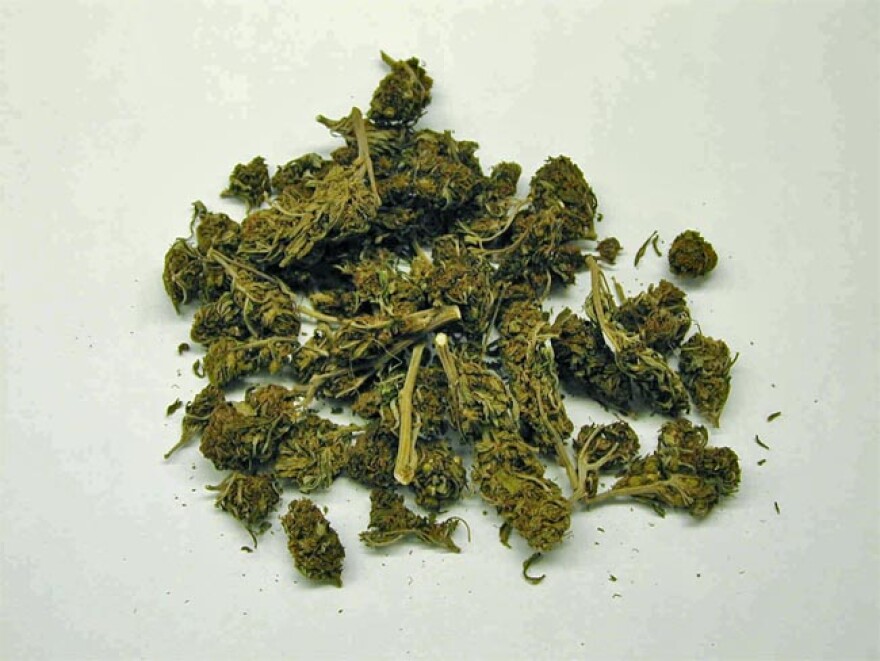Members of the Idaho House this week could vote on a measure that puts the state on record as opposing any form of legal marijuana. Such a vote would put Idaho at odds with the recent push to legalize pot in states like Washington and Colorado. Those who support the measure say approval would be a symbolic victory that would set Idaho apart. Opponents say lawmakers are out of touch on the issue.
Officer Chris Cottrell patrols Interstate 84 in the Boise area for the Idaho State Police. He pulls over between 20 and 30 cars a day. Lately, Cottrell and his fellow officers have been finding more people hauling marijuana to sell locally, and in other states. Where's it going?
"Anywhere from Boise, Nampa, Caldwell, Gooding, Pocatello, to Chicago, Alabama, Georgia," Cottrell says. "The destination is wherever the need is."
Police agencies up and down the interstate say they’re finding more pot more often, as other states in the region have eased up on their marijuana laws. In 2012, the State Police say almost half of the illegally trafficked marijuana they found originated in Oregon and Washington, neighboring states with some form of legal pot.
Last year marked the first time the state police began to track where marijuana was coming from, so long term comparisons can’t be made. But the consensus among police is that lighter laws and less enforcement elsewhere mean more trafficking in Idaho. Tammy de Weerd believes it.
"They’re impacting Idaho communities," she says. "And so that is a concern. That is why we brought that aspect to the state legislature."
de Weerd is the mayor of Meridian, which is part of the Association of Idaho Cities. The group is against any form of legal pot, and asked lawmakers this year to say that they are, too. The Association also asked the legislature to urge Washington D.C. to enforce federal marijuana laws. The president of the association, Garden City Mayor John Evans, says last year's votes in Colorado and Washington to legalize even recreational pot might suggest public opinion is changing. He doesn’t think it is.
"We’ve got a vocal and increasingly organized, in my view, minority that are operating on some level of self interest," Evans says. "I think we need Idahos in this nation to draw a line in the sand on some of these kinds of issues and say ‘Wait a minute'."
Evans thinks those pushing for legal pot are generally younger, and that older lawmakers like him have seen how relaxing laws can hurt a community. But people like Lindsey Rinehart disagree with people like Evans who view pot only in a negative light.
"I think they need education," she says. "They need to be taught. And people don’t want to hear they’ve been duped for 50 years. "
Rinehart is the executive director of a group known as Compassionate Idaho. She was emotional after hearing recent testimony from a woman who told lawmakers using illegal marijuana to treat her chronic pain instead of prescription painkillers saved her life.
Compassionate Idaho is currently working to get an initiative on the ballot that, if passed, would make medical marijuana legal. Rinehart won’t say if she smokes pot. But she admits she would like to be able to legally use marijuana to treat her multiple sclerosis. The fact that she can’t - in a state she otherwise considers to be very caring - doesn’t make sense to her.
"You break down on the side of the road, somebody’s gonna stop and help you out," Rinehart says. "You need help with your family for whatever reason, somebody’s gonna help you. It’s really sad that there are so many sick people and we don’t have enough help."
Rinehart points to a 2011 survey done by Boise State’s Public Policy Center that found 74 percent of Idahoans support legal medical marijuana. But those opposed to any form of legalization don’t buy it.
Boise Sen. Chuck Winder is the lawmaker who introduced the anti-pot legislation for the Association of Idaho Cities. He credits left-leaning cities and college towns for the softening of pot laws in other states. But he thinks most Idahoans still see marijuana as a dangerous drug, and that the issue is part of a “culture war”.
"I think we still want to be that place where we feel safe raising our kids, having a quality workplace, being productive citizens," Winder says. "And I think in the future we’ll hopefully maintain that, and maybe we’ll be a bastion between the extremes out there."
The legislation Winder introduced has had mixed results. The part about asking the federal government to increase its enforcement of drug laws failed. But the other measure distancing Idaho from legal pot appears poised for approval.
On the opposite side of the issue, those organizing the push for legal medical marijuana began circulating petitions two weeks ago. They hope to get enough signatures to put the issue on the ballot in November of next year.
Copyright 2013 Boise State Public Radio



